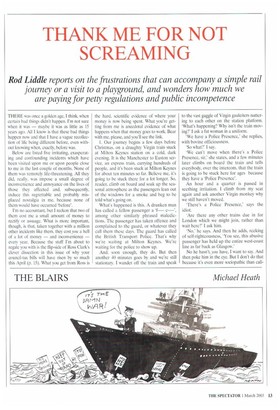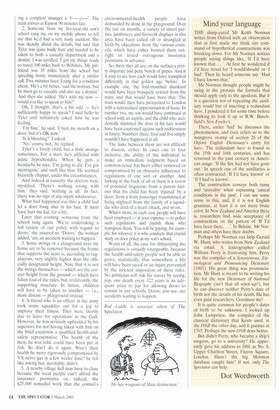THANK ME FOR NOT SCREAMING
Rod Liddle reports on the frustrations that can accompany a simple rail
journey or a visit to a playground, and wonders how much we are paying for petty regulations and public incompetence
THERE was once a golden age, I think, when certain bad things didn't happen. I'm not sure when it was — maybe it was as little as 15 years ago. All I know is that these bad things happen now and that I have a vague recollection of life being different before, even without knowing when, exactly, before was.
Below are listed five irritating, exasperating and confounding incidents which have been visited upon me or upon people close to me in the last couple of months. None of them was remotely life-threatening. All they did, really, was impose a small degree of inconvenience and annoyance on the lives of those they affected and, subsequently, induce this regrettable and probably misplaced nostalgia in me, because none of them would have occurred 'before'.
I'm no accountant, but I reckon that two of them cost me a small amount of money to rectify or assuage. What is more important, though, is that, taken together with a million other incidents like them, they cost you a hell of a lot of money — and inconvenience — every year. Because the stuff I'm about to regale you with is the flip-side of Ross Clark's clever dissection in this issue of why your council-tax bills will have risen by so much this April (p. 15). What you get from Ross is
the hard, scientific evidence of where your money is now being spent. What you're getting from me is anecdotal evidence of what happens when that money goes to work. Bear with me, please, and you'll see the link.
1. Our journey begins a few days before Christmas, on a draughty Virgin train stuck at Milton Keynes station on a cold, dark evening. It is the Manchester to Euston service, an express train, carrying hundreds of people, and it's been stuck at Milton Keynes for about ten minutes so far. Believe me, it's going to be stuck there for a lot longer. So, reader, climb on board and soak up the seasonal atmosphere as the passengers lean out of the windows for a smoke and beg to be told what's going on.
What's happened is this. A drunken man has called a fellow passenger a c—', among other similarly phrased maledictions. The passenger has taken offence and complained to the guard, or whatever they call them these days. The guard has called the British Transport Police, That's why we're waiting at Milton Keynes. We're waiting for the police to show up.
And. soon enough, they do. But then another 40 minutes goes by and we're still stationary. I wander off the train and speak to the vast gaggle of Virgin gauleiters nattering to each other on the station platform. 'What's happening? Why isn't the train moving?' I ask a fat woman in a uniform.
'We have a Police Presence,' she replies, with bovine officiousness.
'So what?' I say.
'We can't move when there's a Police Presence, sir,' she states, and a few minutes later climbs on board the train and tells eveiybody, over the intercom, that the train is going to be stuck here for ages because they have a Police Presence'.
An hour and a quarter is passed in seething irritation. I climb from my seat again and ask another Virgin monkey why we still haven't moved.
'There's a Police Presence,' says the idiot.
'Are there any other trains due in for London which we might join, rather than wait here?' I ask him.
'No,' he says. And then he adds, reeking of self-righteousness, 'You see, this abusive passenger has held up the entire west-coast line as far back as Glasgow.'
No he hasn't, you have, I want to say. And then poke him in the eye. But I don't do that because it's even more sociopathic than call ing a complete stranger a 'f— c—'. The train arrives at Euston 90 minutes late.
2. Someone from my five-year-old son's school rang me on my mobile phone to tell me that he'd had a very nasty accident. She was sketchy about the details, but said that Tyler was quite badly hurt and needed to be taken to both a casualty department and a dentist. I was terrified. I got my things ready to travel 100 miles back to Wiltshire. My girlfriend was 35 miles from the school but speeding home immediately after a similar call. Five minutes later. I rang for a condition check. 'He's a bit better,' said the woman, 'but he must go to casualty and also see a dentist.' And then she added, 'He's with me now — would you like to speak to him?'
Oh, I thought, that's a bit odd — he's sufficiently happy to speak? I said hello to Tyler and tentatively asked how he was feeling.
`I'm fine.' he said. 'I hurt my mouth on a door, but it's OK now.'
'Is it bleeding?' I asked.
`No,' course not,' he replied.
Tyler's a lovely child, but a little strange sometimes. For a start, he's afflicted with acute hypochondria. When he gets a headache he says, 'I'm going to die. I've got meningitis,' and stuff like that. He seemed bizarrely chipper, under the circumstances.
And indeed at casualty the doctors were mystified. 'There's nothing wrong with him,' they said, 'nothing at all.' In fact, there was no sign of any injury whatsoever.
What had happened was this: a child had let a door bang shut in his face. It must have hurt the kid, for a bit.
Later that evening, someone from the school rang again. 'We're undertaking a full review of our policy with regard to doors,' she assured us. 'Doors,' the woman added, 'are an accident waiting to happen.'
3. Some swings in a playground near my home are to be removed because the frame that supports the seats is, according to regulations, very slightly higher than the officially designated height. Note that it is not the swings themselves — which are the correct height from the ground — which have fallen foul of the rules, but, irrelevantly, the supporting structure. In future, children will have to be taken to another — i.e., more distant — playground instead.
4. A friend who is an officer in the army took some squaddies out for a jog to improve their fitness. They were shortly due to leave for operations in the Gulf. However, he was seriously upbraided by his superiors for not having taken with him on the brief excursion a qualified health-andsafety representative. The health of the men, he was told, could have been put at risk. So don't do it again. Won't their health be more rigorously compromised by VX nerve gas in a few weeks' time? he felt like asking hut, inevitably, didn't.
5. A nearby village hall may have to close because the local people can't afford the insurance premiums or, indeed, the £25,000 remedial work that the council's environmental-health people have demanded be done in the playground. Over the last six months, a variety of street parties, jamborees and firework displays in this area have been called off or strangled at birth by objections from the various councils, which have either banned them outright or levied outrageous insurance premiums in advance.
So, there they all are: on the surface a pretty disparate and petty bunch of gripes. And it is easy to see how each would have transpired differently in that golden age 'before'. In example one, the foul-mouthed drunkard would have been brusquely evicted from the train, and that would have been that. The train would then have proceeded to London with a nationalised approximation of haste. In number two, my son would have continued at school with an aspirin, and the child who accidentally slammed the door in his face would have been cautioned against such recklessness in future. Numbers three, four and int simply wouldn't have happened at all.
The links between them are not difficult to discern, either. In cases one to four inclusive, the ability of the individual to make an immediate judgment based on common sense has been either removed or compromised by an obsessive adherence to regulations of one sort or another. And lurking at the back of all of them is a terror of potential litigation; from a parent furious that his child has been 'injured' by a door; from a train passenger traumatised at being slighted; from the family of a squaddie who died of a heart attack, and so on.
What's more, in each case people will have been employed — at your expense — to police such regulations and punish those who transgress them. You will be paying, for example, for whoever it is who conducts that crucial study on door policy at my son's school.
Worst of all, the case for obliterating the regulations is virtually unarguable, because the health-and-safety people will be able to prove, statistically, that somewhere a life will have been saved or an injury prevented by the strictest imposition of these rules. No politician will risk his career by saying, yep, one death every 322 years is an adequate price to pay for allowing doors to remain in our schools. Doors, you see, are accidents waiting to happen.



















































































 Previous page
Previous page